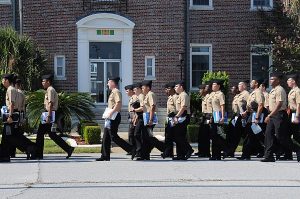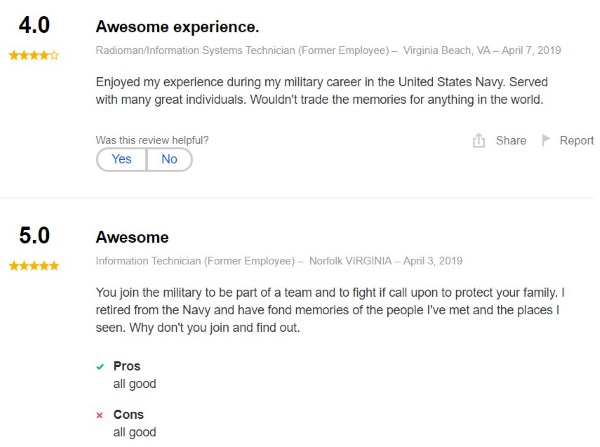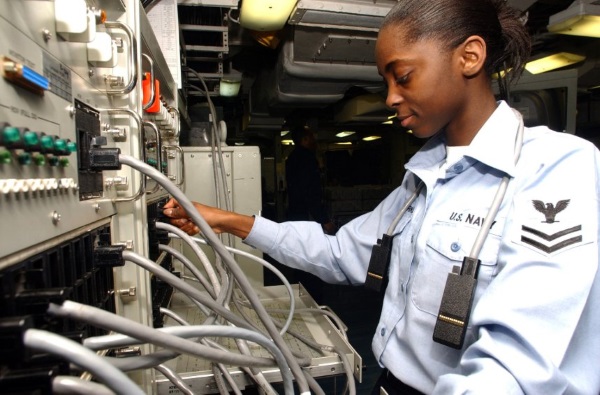Navy Information Systems Technicians are Enlisted personnel who perform a multitude of information and cryptology technology-related functions on various systems throughout the fleet.
This includes the administration, maintenance, and operation of mini and microcomputers, global satellite telecommunications systems, mainframe computers, local and wide area networks, and all associated peripherals both onboard ships, Naval Operating Bases, Naval Air Stations, Naval Amphibious Bases, and various other Navy and Joint Command land installations throughout the world.
Navy Information System Technicians are charged with providing administrative support in the operation of the electronic systems that keep records of personnel training, health, assignments, disbursement, and promotions within the Navy.
Related Article – Navy Jobs List: A List Of All 71 Ratings In The Navy
The responsibilities of Navy Information Systems Technicians are broad and include such tasks as LAN/WAN administration, software installation, support, and upgrades, computer hardware implementation and maintenance, technical support, and database administration.
Navy Information Systems Technicians are vital members of the Navy’s Information Dominance Corps (IDC).
The IDC is the Navy’s community of skilled specialists whose expertise maximizes the Navy’s information dominance by helping to ensure America’s national and economic security.
Jump To A Section
Requirements and Qualifications
To become a Navy Information Systems Technician, there are specific requirements and qualifications that you must meet:
- Must be a U.S. Citizen.
- Must be a member of the U.S. Navy.
- Must be between the ages of 18 and 39.
- Must have normal hearing.
- Must have normal color perception.
- Must have no speech impediment.
- Must meet eligibility requirements for a Top Secret/sensitive compartmented information (SCI) clearance (This is determined by a Single Scope Background Investigation and is re-investigated/renewed every five years).
- Must have an Armed Forces Vocational Aptitude Battery (ASVAB) score of AR (Arithmetic Reasoning) + 2MK (Mathematics Knowledge) + GS (General Science) = 222; or AR + MK + EI (Electronics Information) + GS = 222, or CT + MK + VE = 162 and CT>60.
- Immediate family members must be U.S. citizens or citizens of “low-threat” nations.
- Meet the Navy PRT Test standards
Related Article: Navy Height And Weight Standards
Training and Career Path
Prior to becoming a Navy Information Systems Technician, you must first become a U.S. Navy sailor. This is accomplished via the successful completion of recruit training, commonly referred to as boot camp.
All sailors attend boot camp at the Recruit Training Command, Great Lakes (RTC Great Lakes).
Commonly referred to as “The Quarterdeck of the Navy,” RTC Great Lakes is located at Naval Station Great Lakes in North Chicago, Illinois in Lake County.
Boot camp is 7-9 weeks long. During these weeks, the Navy will teach you the basic skills required of all U.S. sailors. This includes:
- Physical Conditioning
- Swimming
- Rank and Rate Details
- Navy Core Values
- Chain of Command
- Navy Customs and Courtesies
- Basic Watchstanding Skills
- Armed Conflict
- Personal Finance
- Basic Seamanship
- Shipboard Communications
- Navy Ship and Aircraft Identification
- Weapons Training
- Military Drill Instruction
- Shipboard Damage Control
- Shipboard Firefighting
Please note that this list is but a basic overview of the skill taught during boot camp and is not all-inclusive.
Navy Information Systems Technicians A School
After boot camp, Navy Information Systems Technicians are sent to Information Systems Technician A School at the Center for Information Dominance Unit Corry Station in Pensacola, Florida.

Information Systems Technician “A” school is approximately 24 weeks long. It comprises computer labs, group instruction, and ship simulators.
Navy Information Systems Technician candidates will learn the fundamentals of software systems including Microsoft, Cisco, and Oracle.
In addition, sailors receive instruction on the fundamentals of computer hardware, networking, automated data processing, and other various areas related to information and communication systems.
Besides Information Systems “A” school, Navy Information Systems Technicians are expected and encouraged to complete self-paced Non-Resident Training Courses (NRTC) when they get to the fleet to enhance their knowledge and increase their promotion opportunities.
NRTCs specific to Navy Information Systems Technicians are comprised of five modules:
- 01: Administration and Security
- 02: Computer Systems
- 03: Network Communications
- 04: Communication Hardware
- 05: Communication Center Operations
Navy Information Systems Technicians are also strongly encouraged to self-study to obtain industry-specific certifications to better themselves such as CompTIA A+, CompTIA Linux+, Cisco Certified Network Associate (CCNA), and Microsoft Certified Solutions Expert (MCSE).
The Navy provides online training to qualified Navy Information Systems Technicians through their Credentialing Opportunities On-Line website, referred to as Navy COOL.
Also, in most instances, the Navy pays for the cost of the certification exam.
How Much Are Navy Information Systems Technicians Paid?
Like all other enlisted personnel (in all branches), pay is based on a sailor’s rank and length of service.
| Insignia | Pay Grade | Rank | Abbreviation | 2023 Minimum Monthly Pay |
|---|---|---|---|---|
| N/A | E-1 +4 months | Seaman Recruit | SR | $1,917.60 |
| E-2 | Seaman Apprentice | SA | $2,149.20 | |
| E-3 | Seaman | SN | $2,259.90 | |
| E-4 | Petty Officer Third Class | PO3 | $2,503.50 | |
| E-5 | Petty Officer Second Class | PO2 | $2,730.30 | |
| E-6 | Petty Officer First Class | PO1 | $2,980.50 | |
| E-7 | Chief Petty Officer | CPO | $3,445.80 | |
| E-8 | Senior Chief Petty Officer | SCPO | $4,957.20 | |
| E-9 | Master Chief Petty Officer | MCPO | $6,055.50 | |
| E-9 | Command Master Chief Petty Officer | CMDCM | $6,055.50 | |
| E-9 | Master Chief Petty Officer Of The Navy | MCPON | $6,055.50 |
Navy Information Systems Technicians may be entitled to other forms of compensation including basic allowance for housing (BAH), base allowance for subsistence (BAS), and billet pay (sea pay, flight pay, hazardous duty pay, etc.) if eligible.
Related Article: Navy Ranks And Pay
History of the Navy Information Systems Technician
Tradition, customs, and history are extremely important in the United States Navy.
Sailors learn Naval history during their time at RTC Great Lakes and both learn and live Navy traditions and customs throughout their careers.
As such, it is only fitting that we explain the evolution of the Navy Information Systems Technician.
The Radioman (RM) rate was first established in 1921.

The Data Processing Technician (DP) came into existence in 1967. The rating was a combination of the Machine Accountant (MA) rating and the ESR ratings of Specialist (I) and Specialist (X), or ‘Key Punch Operator’ (KP).
The Data Processing Technician rating was merged into the Radiomen rating in 1997.
The Radioman rating name was changed to Information Systems Technician (IT) in 1999.
In 2005, the Cryptologic Technician (Communications) CTO rating merged into the IT rating.
There also exists an Information Systems Technician Submarines (ITS) rating in the Navy.
Established in 2010, Navy Information Systems Technician Submariners have the exact same requirements as do Navy Information System Technicians but must attend Basic Enlisted Submarine School in Groton, CT for nine weeks after boot camp.
They then attend a separate 24-week ITS “A” school in Groton prior to deploying to the fleet.
What’s Life Like as a Navy Information Systems Technician?

The Navy website describes the typical work of a Navy Information Systems Technician as involving “mental analysis and problem solving” that “takes place in clean, air-conditioned electronic equipment space or computer rooms.”
However, it is much more than that.
Navy Information Systems Technicians usually have jobs that fall into one of four categories:
- Communication Technician
- Network Technician
- Security Technician
- Security Manager
Navy Information Systems Technicians should, however, anticipate that they will perform one or more, or even all, of these roles depending on the size of their duty station and the needs of the command and Navy.
Related Article – Navy Air Traffic Controller: Pay, Duty Stations, and More
The duties of Navy Information Systems Technicians vary widely and include:
- Transmitting, receiving, monitoring, operating, processing, and controlling all forms of telecommunications via various transmission methods including global networks.
- Performing the functions of a computer systems analyst.
- Designing, installing, maintaining, and operating state-of-the-art information systems. These systems include mainframe, mini and microcomputer systems, local area networks, wide area networks, global satellite telecommunication systems, and associated peripheral devices.
- Maintaining and reviewing all necessary logs, files, and publications in the communications center.
- Diagnosing problems/issues in all facets of integrated information systems and applying all corrective and recovery techniques necessary.
- Providing computer and telecommunications training and assistance to Navy personnel as required/requested.
- Coding programs that handle the collection, manipulation, and distribution of data for a vast variety of applications and requirements.
- Operating and coordinating telecommunications systems such as automated networks along with the full spectrum of data links and circuits.
- As you advance in rank as a Navy Information Systems Technician, you will find that while your pay increases, so will your responsibilities. It is not uncommon for an IT2 to be responsible for an entire LAN, for example. Or you may be charged with the installation of an entirely new system.
First Class Petty Officer Marie Antoinette Molina and Chief Petty Officer Angelena Bell Holifield describe the life of a Navy Information Systems Technician)
You will also be expected to lead and supervise less senior Navy Information Systems Technicians in your department/division as your Navy career progresses.
Sailors in specific jobs (or rates, as they are known in the Navy) must adhere to a Sea/Shore rotation based on their rate.
Navy Information Systems Technician Sea/Shore Rating is:
-
Tour Sea Tour Shore Tour First Tour 48 Months (4 Years) 36 Months (3 Years) Second Tour 36 Months (3 Years) 36 Months (3 Years) Third Tour 36 Months (3 Years) 36 Months (3 Years) Fourth Tour 36 Months (3 Years) 36 Months (3 Years) Fifth Tour 36 Months (3 Years) 36 Months (3 Years) Sixth Tour 36 Months (3 Years) 36 Months (3 Years) Seventh Tour 36 Months (3 Years) 36 Months (3 Years)
Note that some overseas assignments count as sea tours.
Obviously, life aboard ship and life while on shore duty will be drastically different.
Navy Information System Technicians are expected to adapt and meet the challenges presented by these different environments.
There are a great many benefits afforded to Navy Information System Technicians such as cool, clean, comfortable work environments, opportunities to travel the world, great and varied benefits, unlimited opportunities for learning and advancement, and control over your career.
Here are a few reviews we happened across on indeed.com for a Navy Information Systems Technician:


The average rating for Navy Information Systems Technician on indeed.com is 4.3 out of a possible 5.
Noteworthy is that Navy Information Systems Technicians, like all other rates, are considered sailors first.
That is, you will have collateral duties which may include standing watches, working parties, firefighting duties, damage control duties, and other various tasks as assigned by your chain of command.
Civilian Career Opportunities
Civilian Career Opportunities abound for the Navy Information Systems Technician when he or she leaves or retires from the Navy.
This is particularly true if the sailor took full advantage of the on-the-job (OJT) and educational opportunities afforded them during their service.
Civilian occupations for Navy Information Systems Technicians include, but are not limited to:
- Systems administrator
- Systems analyst
- Technical support engineer
- Call center supervisor
- Computer field technician
- Information security manager
- Web developer
- Database administrator
- Technical support analyst
- Data architect
- Hardware engineer
- Computer technical support specialist
According to Payscale, the average annual salary for an Information Systems Technician is $52,148.
If you are a young person considering joining the U.S. Navy, life as a Navy Information Systems Technician offers a fast-paced, adventurous life in uniform, along with a plethora of opportunities both as a sailor and later in life as a civilian.
Have a question about Navy Information Systems Technicians? Leave it in the comments below!
References
- Gas Turbine Systems Technician (GSM and GSE): Career Details - June 18, 2024
- Interior Communications Electrician (IC): 2023 Career Details - June 18, 2024
- Religious Program Specialist (RP): 2023 Career Details - June 18, 2024
General FAQ
How long is A-School for Information Systems Technician in the Navy?
Navy Information Systems Technician A-School is 24 weeks long and includes computer labs, group instruction, and simulators. The Navy provides online training for computer systems credentialing and certification.
What ASVAB scores do you need to be IT in the Navy?
To become a Navy Information Systems Technician, you’ll need a combined score of 222 in the Math Knowledge, Electronics Information, General Science, and Arithmetic Reasoning portions of the ASVAB.
Do you need a security clearance to be a Navy Information Systems Technician?
To become a Navy Information Systems Technician, you and your immediate family must be U.S. citizens, and you’ll need to qualify for a Top Secret security clearance.
What kind of equipment do Navy Information Systems Technician work on?
Navy Information Systems Technicians work in computer rooms and manage networks and communications systems as well as performing cyber security functions. They’ll work on mini, micro, and mainframe systems. LANs, and global satellite systems.
How much do Navy Information Systems Technicians make?
Like all Navy careers, Information Systems Technicians are paid according to rank and time in service. A new sailor with less than two years in service can currently expect to make about $1,700 monthly base pay, before allowances and incentive pay.

